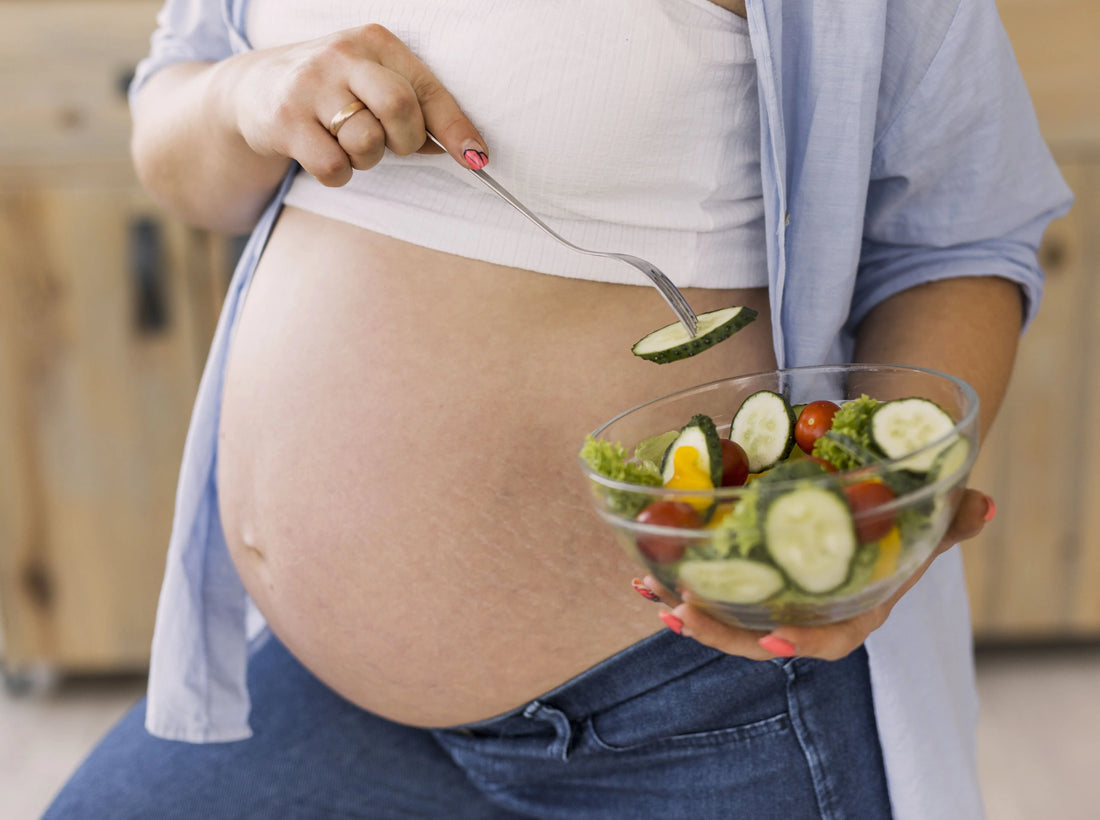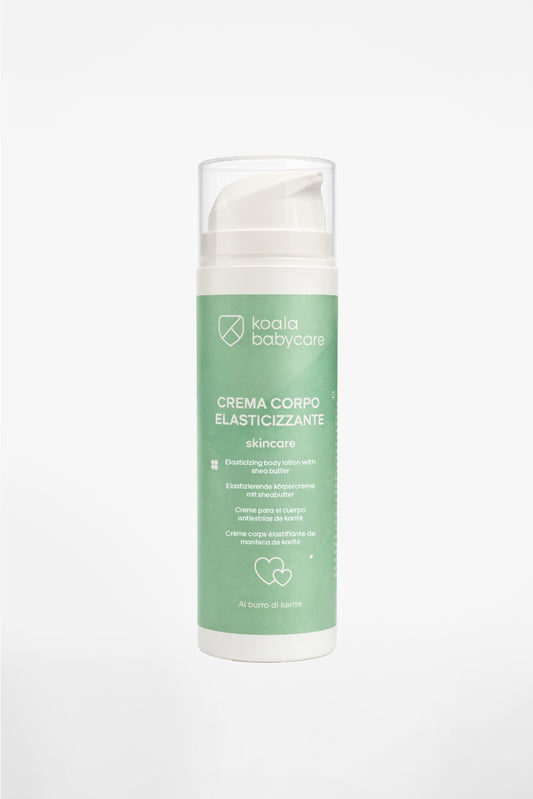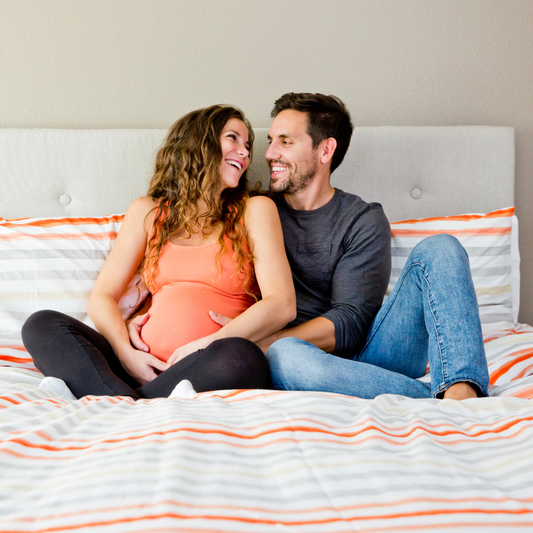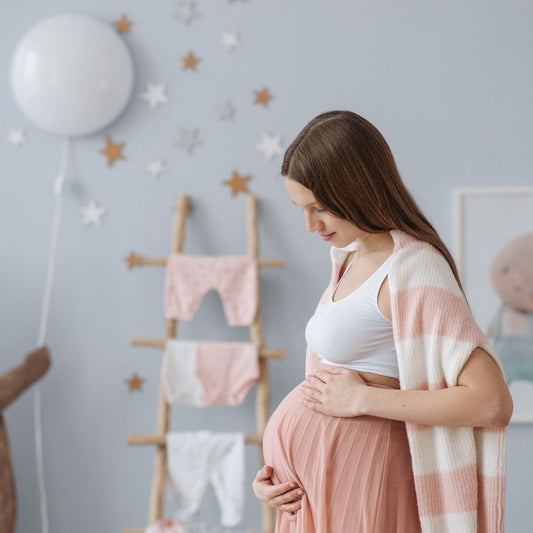Should a pregnant woman eat for two? Let's clarify this point straight away - absolutely not! An unborn baby, who’s still very small, needs about 200-250 kcal per day.
What you can do instead is to eat better! Unless you already have a well-balanced diet... in which case you’ll discover that you don’t need to make too many changes.
Nowadays, it’s common knowledge that eating a healthy diet during pregnancy reduces complications during gestation and childbirth.
It also appears that many chronic illnesses such as diabetes, hypertension and cardiovascular diseases are linked to a poor diet from when inside the womb.
If you're wondering what’s the best nutritional diet for pregnancy and foods to avoid during pregnancy for both you and your baby’s health and wellbeing... you've come to the right place! Read on to find out more.
Guidelines for healthy eating during pregnancy
Guidelines on a pregnancy nutrition plan are very similar to the standard guidelines for a healthy, balanced diet, albeit with a few exceptions: there are certain foods which should be avoided when pregnant and your calorie intake requirement is slightly higher. Here are some useful tips!
What nutrients do I need to consume?
A pregnancy eating plan should include vegetables, fruit, protein, and carbohydrates.
Calorie consumption should come mainly from plant-based food: fruit and vegetables in large quantities, complex carbohydrates preferably whole-grain (bread, rice, pasta, and potatoes), pulses (chickpeas, beans, lentils, and peas) and nuts (walnuts and almonds).
Food deriving from animal origin should be consumed with more care: meat, eggs (always well-cooked), cheese and fish. Fish is preferable as it’s a great source of 'healthy fats' and Omega 3.
With a meal plan for pregnant women like this, which is varied and rich in fibre, minerals, vitamins, and protein, mums-to-be won’t be missing out on any of the essential nutrients they need.
Those who follow a different diet should consult their doctor or NHS midwife to discuss how they can best supplement all the nutrients they need.
For example: a vegan diet is poor in vitamin B12, which is very important during pregnancy, therefore, it needs to be supplemented under the guidance of a doctor or healthcare professional.
Summing up: what are the best foods to eat while pregnant and what can i not eat when pregnant?
Lots of fruit and vegetables (washed thoroughly) and nuts and dried fruit are nutritious snacks for pregnancy as they are a great source of healthy fats and Omega 3!
Lighter more frequent meals
It’s better to eat a higher number of light meals than to binge twice a day. That’s why guidelines recommend, whether you are pregnant or not, consuming three main meals a day with two snacks in between.
A healthy diet includes a light breakfast, lunch and dinner and a mid-morning and mid-afternoon snack. What are considered healthy pregnancy snacks? Yoghurt, nuts, and fruit.
What food to avoid when pregnant?
It’s widely known that during pregnancy, certain foods should be avoided as they can present health risks for the unborn baby, such as Toxoplasmosis, Listeriosis and Salmonellosis. Let’s take a look at the list in more detail:
- Raw and undercooked foods (sushi, cured meats, carpaccio...).
- Soft, semi-soft and blue cheeses that derive from unpasteurised raw milk, unless cooked thoroughly prior to consumption.
- Poor quality meat, such as hotdogs.
- Raw, unwashed fruit and vegetables (you can eat all the vegetables and fruit you want, as long as they have been washed through carefully!).
- Alcoholic beverages, including wine, should be completely avoided as there’s no conclusive data available to indicate a minimum value which won’t cause harm to an unborn baby.
- Raw or undercooked eggs and food containing such, such as fried, soft-boiled, or poached eggs; homemade mayonnaise; tiramisu, and vitel tonné.
In addition to the list of foods to stay away from while pregnant, there are certain foods that can be consumed but in limited quantities:
- Added sugars, such as snacks and soft drinks.
- Caffeine, which should be consumed a couple of times a day at most.
- Table salt, which should be limited and replaced with iodised salt. When pregnant, your body needs a higher intake of iodine than before, therefore it’s important to ensure you consume sufficient quantities.
Cheese to avoid during pregnancy
Cheese for pregnant woman: what cheese can you eat in pregnancy and what type should you avoid?
Cheeses deriving from unpasteurised raw milk are harmful during pregnancy. For example, soft mould cheeses with an outer coating such as Brie, Camembert, Gorgonzola, Taleggio. Or soft blue cheeses such as Danish Blue and Roquefort.
What cheese can you eat when you are pregnant without risk? Parmesan and Grana Padano, Ricotta, Mozzarella, Feta, Cream cheese spreads, Yoghurt and Cream.
How to avoid gaining too much weight during pregnancy
An important yet obvious fact to remember, during pregnancy, a woman should not lose weight, but gain it. Therefore, we’re not going to talk about how not to gain any weight, but rather how not to do so in an excessive and unhealthy way.
Weight gain during pregnancy varies from woman to woman, and sometimes from pregnancy to pregnancy. It depends on many factors, in particular physical constitution of the mum-to-be.
On average, a pregnant woman should gain between 9 and 13 kilograms, but slimmer women can gain as much as twenty kilos without any problems for either their own health or post-natal figure as well as their baby’s wellbeing. A fuller woman may put on proportionally fewer kilos.
Where does the extra weight go?
The main reason behind weight gain is not the unborn baby rather our own body preparing for birth: our breasts increase, as does blood volume, then there’s the placenta, amniotic fluid, fat stores...
How can we avoid gaining too much weight and then struggling to lose it after the birth?
Excessive weight gain is often more of a psychological factor: just because we are pregnant, we often believe that we’re allowed to make a few extra exceptions to the rule. 'After all, you have to eat for two,' we convince ourselves.
Keep in mind that an unborn baby's calorie requirement is around 250 kcal per day. Your own daily calorie requirement, therefore, varies only slightly.
What do the experts advise? Choosing whole grains over refined, consuming an abundance of fruit and vegetables and avoiding fried foods and added sugars. Drinking plenty of water to combat water retention.
Add in an active lifestyle: light physical activity such as Pregnancy yoga, long walks.
Pregnancy diet first trimester
What type of foods to eat in the first trimester of pregnancy? During early pregnancy, calorie requirements do not tend to increase and on average a woman should only gain 1-2 kg.
We recommend following a varied and healthy diet starting from this stage, as per our nutrition guide above.
During the first trimester it’s important to supplement folic acid.
Folic Acid is a vitamin which plays an important role throughout our lives, and particularly during pregnancy: it favours correct development of the foetus' nervous system, preventing neural tube defects such as spina bifida.
What are the best foods for morning sickness?
Nausea, commonly referred to as morning sickness, during the first few weeks of pregnancy is very common. It usually passes within the first 20 weeks, but in some cases can last longer. It varies from mum to mum!
What are the foods that help with morning sickness? Dry carbohydrates and crackers should relieve your stomach. Ginger can also help, either eaten fresh or boiled in water and then drunk as an herbal tea.
Pregnancy diet for third trimester
During the later stages of pregnancy, you’ll feel more and more tired. Organs move around to make room for the baby and your digestive system slows down.
Consequently, many mums-to-be suffer from heartburn or acid reflux.
Eating small, light, and frequent meals and avoiding heavy and fatty dishes, has never been more important than now.
Your need for protein, iron, and Omega 3 increases, so it’s good to include plenty legumes, meat, and fish in your diet.
Acid reflux and heartburn during pregnancy: what to eat?
Heartburn and acid reflux during pregnancy are common disorders, especially during the third trimester.
Eliminating caffeine (remember that also includes tea and coke), spicy foods and fried foods may help.
Stand upright after meals. If you feel the need to lie down, put a pillow behind your back so that you’re sitting up.
The key word for a nutritional diet for pregnant women is 'healthy', a varied well-balanced diet, low in fat and added sugar with plenty of fruit and vegetables. During this period of our lives, we should not only be thinking about our own health, but also that of our unborn baby!







